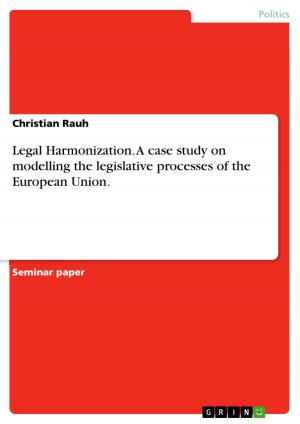Imagined Enemies
On Crusaders and Terrorists in the Middle East
Nonfiction, Social & Cultural Studies, Political Science, International, International Security| Author: | Steve Nowak | ISBN: | 9783640585472 |
| Publisher: | GRIN Publishing | Publication: | April 6, 2010 |
| Imprint: | GRIN Publishing | Language: | English |
| Author: | Steve Nowak |
| ISBN: | 9783640585472 |
| Publisher: | GRIN Publishing |
| Publication: | April 6, 2010 |
| Imprint: | GRIN Publishing |
| Language: | English |
Seminar paper from the year 2010 in the subject Politics - International Politics - Topic: Peace and Conflict Studies, Security, grade: 1,0, East Tennessee State University (History Department), course: Origins of Problems in the Middle East, language: English, abstract: In September 2001, shortly after the terrorist attacks on America, President George W. Bush announced his 'Crusade' against terrorism - a Crusade that was aimed mainly at Islamic fundamentalists. One Millennium after the first Crusades, that conflict seemed still going on and the connection to that fateful day in September 2001 was drawn easily. The fight had been going on since the first expansion of Islam into the former Christian world. An everlasting conflict between Christians in the West and Muslims in the East seems so obvious that we take it for self-evident when we perceive our political world. Authors have written and modified it repeatedly. Not long ago, Bernard Lewis wrote his Islam and the West telling us about the history of these cultures as a history of military conflict. One more famous book takes that approach to take a look at the recent development in world politics and predict its Clash of Civilizations. Huntington shows the post-Cold War world by explaining global politics along cultural lines. One of the most important of these lines is, not surprisingly, the one between the Islamic and the Western Civilizations. But what if we take a closer look on what appears to be behind the ambiguous history of Crusades and Holy Wars. Are there perhaps more sophisticated explanations. We have to differentiate the motives for the main campaigns in an assumed 'continuous conflict.' Therefore we will see over the Crusades, the fierce war at the front between Christendom and Islam under Ottoman rule and finally the modern antagonisms to verify or falsify that theory of a causally determined cultural conflict.
Seminar paper from the year 2010 in the subject Politics - International Politics - Topic: Peace and Conflict Studies, Security, grade: 1,0, East Tennessee State University (History Department), course: Origins of Problems in the Middle East, language: English, abstract: In September 2001, shortly after the terrorist attacks on America, President George W. Bush announced his 'Crusade' against terrorism - a Crusade that was aimed mainly at Islamic fundamentalists. One Millennium after the first Crusades, that conflict seemed still going on and the connection to that fateful day in September 2001 was drawn easily. The fight had been going on since the first expansion of Islam into the former Christian world. An everlasting conflict between Christians in the West and Muslims in the East seems so obvious that we take it for self-evident when we perceive our political world. Authors have written and modified it repeatedly. Not long ago, Bernard Lewis wrote his Islam and the West telling us about the history of these cultures as a history of military conflict. One more famous book takes that approach to take a look at the recent development in world politics and predict its Clash of Civilizations. Huntington shows the post-Cold War world by explaining global politics along cultural lines. One of the most important of these lines is, not surprisingly, the one between the Islamic and the Western Civilizations. But what if we take a closer look on what appears to be behind the ambiguous history of Crusades and Holy Wars. Are there perhaps more sophisticated explanations. We have to differentiate the motives for the main campaigns in an assumed 'continuous conflict.' Therefore we will see over the Crusades, the fierce war at the front between Christendom and Islam under Ottoman rule and finally the modern antagonisms to verify or falsify that theory of a causally determined cultural conflict.















